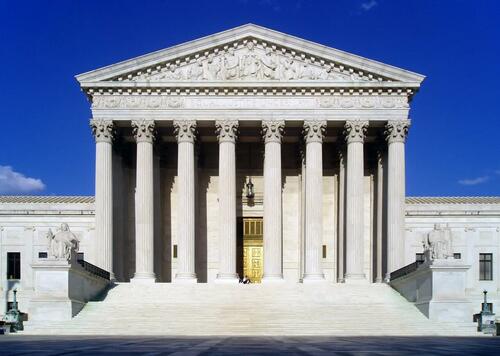‘Oral Argument Favored Defendants’ – Supreme Court Just Ended Hearing Obstruction Case Affecting J6 Defendants
Today, the U.S. Supreme Court will take up Fischer v. United States, a case that could fundamentally change many cases of January 6th defendants, including the prosecution of former president Donald Trump. The case involves the interpretation of a federal statute prohibiting obstruction of congressional inquiries and investigations.
The case concerns 18 U.S.C. § 1512(c)(2), which provides:
“Whoever corruptly—(1) alters, destroys, mutilates, or conceals a record, document, or other object, or attempts to do so, with the intent to impair the object’s integrity or availability for use in an official proceeding; or (2) otherwise obstructs, influences, or impedes any official proceeding, or attempts to do so, shall be fined under this title or imprisoned not more than 20 years, or both.”
Joseph Fischer was charged with various offenses, but U.S. District Judge Carl J. Nichols of the District of Columbia dismissed the 1512(c)2 charges. Judge Nichols found that the statute is exclusively directed to crimes related to documents, records, or other objects.
The D.C. Circuit reversed and held that Section 1512(c)(2) is a “catch all” provision that encompasses all forms of obstructive conduct. Circuit Judge Florence Pan ruled that the “natural, broad reading of the statute is consistent with prior interpretations of the words it uses and the structure it employs.” However, Judge Gregory Katsas dissented and rejected “the government’s all-encompassing reading.”
The Court will now consider the question of whether the U.S. Court of Appeals for the District of Columbia Circuit erred in construing 18 U.S.C. § 1512(c), which prohibits obstruction of congressional inquiries and investigations, to include acts unrelated to investigations and evidence.
The law itself was not designed for this purpose. It was part of the Sarbanes-Oxley Act of 2002 and has been described as “prompted by the exposure of Enron’s massive accounting fraud and revelations that the company’s outside auditor, Arthur Andersen LLP, had systematically destroyed potentially incriminating documents.”
Oral argument is today and Turley is be covering the arguments on X (Twitter)…
…Justice Sotomayor was quick out of the gate to pursue a tough line of questioning for the defense counsel on why the broader meaning is warranted…
…Justice Barrett continued the tough questioning by asking if the defendant can still be convicted for seeking obstructing by seeking to stop the certificates themselves. In this way, the Court could adopt a narrower meaning but still allow for possible prosecution…
…Justice Jackson has also questioned counsel closely on the use of “evidence” as a term since it does not appear in the actual provisions…
…Justice Sotomayor just said that this may be unique because no one tried to violently stop proceedings as on Jan. 6th…
The government is now up with its case…
…Chief Justice Roberts just delivered a haymaker for the Solicitor General by noting a recent decision and prior decisions that stress the need for narrow construction in this type of “otherwise” construction of provisions…
…Roberts is not buying the government’s argument on getting around prior cases including one just issued on Friday. I have great respect for Prelogar but she is struggling on this point…
…The exchange has brought out Justice Gorsuch who is pressing on what “otherwise” really means under the government’s view. Gorsuch is asking if a heckler at the State of the Union qualify. Ironically, that is precisely the hypothetical that we struggled with in my Supreme Court ask in discussing this case.
…“Would a sit-in that disrupts a trial or access to a federal courthouse qualify?” Justice Neil Gorsuch asked.
…Gorsuch also raised pulling a fire alarm in a reference to Rep. Jamaal Bowman of New York and asked if that was also a felony subject to 20 years…
…Gorsuch is carving up the government’s argument on the lack of clear lines for protests and other examples…
…Now Justice Alito is raising an interruption of the Supreme Court. If that caused a delay of five minutes, would it also qualify as a violation of 1512(c)(2). Prelogar stumbled on this one. She tried to add an exception for a de minimus violation, but Alito notes that she was arguing plain meaning and this was qualify as a delay according to the plain meaning. Prelogar simply argues it would be hard to prove …
…Prelogar fell back on saying how bad Jan. 6th was but that did not fly for good reason. The issue here is how to define this provision…
…Prelogar was a bit on the ropes and Justice Kagan stepped in with a breather question on what evidence they often use against J6 defendants.
…back to the oral argument, Prelogar admitted to Justice Alito that a minimal interference could potentially qualify, but questioned the likelihood of such a case. Alito hit her with how she would define minimal and said that the interruption of the Court “sounds minimal to me”…
…That is not going to satisfy the concerns of the justice as a type of “we know it when we see it” standard…
The Court just ended argument.
The three liberal justices offered support for the government and Justice Barrett seemed on the fence at points.
It is hard to tell where Barrett may end up.
However, there was clearly a skepticism from four justices, including Chief Justice Roberts.
The oral argument favored the defendants and could result in a wider impact on dozens of cases, including the prosecution of former President Trump.
The loss of the obstruction counts for Jack Smith would undermine his narrative (giving Trump new grounds to seek dismissal of two of the four counts in the federal prosecution against him for trying to overturn his 2020 election loss), but he could proceed on the remaining counts.
Tyler Durden
Tue, 04/16/2024 – 13:20
via ZeroHedge News https://ift.tt/oPThxOY Tyler Durden
